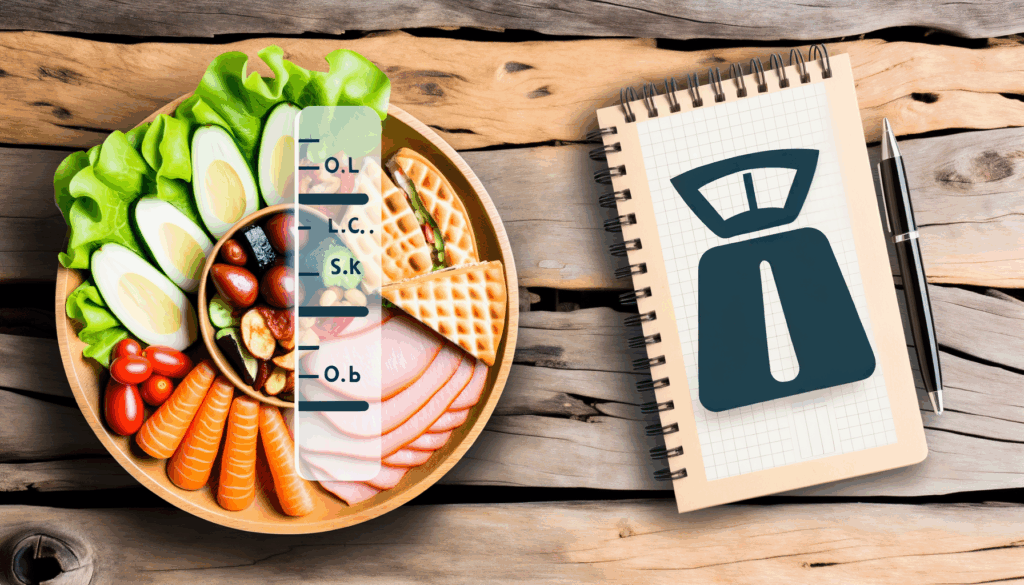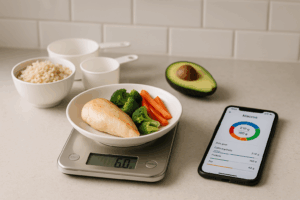Gaining or losing weight is more complex than simply eating more or less food. The science of weight management hinges on understanding your diet and managing calorie deficits and surpluses. In this article, you’ll explore the critical concepts behind weight gain, diet planning, and how the calorie deficit or surplus affects your results, setting the foundation for sustainable progress.
The Science Behind Weight Gain and Loss
Body weight is largely determined by the principle of energy balance: the relationship between calories consumed and calories expended. When calorie intake exceeds the body’s energy requirements, the surplus is stored—primarily as fat—leading to weight gain. Conversely, a calorie deficit, when calorie expenditure surpasses intake, results in weight loss as the body taps into stored energy, breaking down fat and, to some extent, muscle tissue to meet its needs. Metabolism—the sum of chemical reactions in the body—plays a key role in this process, dictating how efficiently food is converted into usable energy. Factors such as age, genetics, muscle mass, and physical activity influence individual metabolic rates, meaning the same diet impacts different people uniquely. Diet composition further interacts with metabolism, affecting not just weight but overall health and body composition, laying the groundwork for effective diet planning based on specific goals.
Diet Planning for Your Goals
Crafting an effective diet plan requires aligning food choices with your specific objective—whether you’re looking to gain or lose weight. For those aiming to *gain* weight (“bulking”), the diet should prioritize calorie-dense foods with ample protein, complex carbohydrates, and healthy fats. Foods like lean meats, oily fish, whole grains, avocados, and nuts facilitate muscle growth and contribute essential micronutrients, which support metabolic and hormonal function. Conversely, *losing* weight (“cutting”) focuses on calorie control, choosing high-volume, nutrient-rich foods like vegetables, legumes, and lean proteins to preserve muscle while controlling hunger. *Meal timing*—such as distributing protein intake throughout the day—and careful *portion control* further optimize progress. Both approaches demand attention to food quality and a balance of macronutrients and micronutrients.
Understanding Calorie Surplus and Deficit
Understanding calorie surplus and calorie deficit is key for controlling body weight. To put it simply, a calorie surplus means consuming more calories than you burn, resulting in weight gain. A calorie deficit, on the other hand, arises when you eat fewer calories than your body uses, leading to weight loss. To find out how many calories you need to maintain your weight—your maintenance calories—you can use formulas like the Harris-Benedict equation, which factors in age, weight, height, and activity level. Regularly track your intake and body weight; if your weight is stable, you’re at maintenance. To intentionally gain, raise intake by 250–500 calories daily. For weight loss, reduce by 250–500 calories per day for steady, controlled progress.
Practical Strategies for Healthy Weight Gain
For those seeking healthy weight gain, focus on increasing calories with wholesome, nutrient-rich choices while supporting muscle growth. Gradually add 300-500 calories per day from foods like nut butters, olive oil, avocado, full-fat dairy, eggs, and legumes—these pack nutrition in each bite. Emphasize consistency in meals and snacks, aiming for balanced plates featuring proteins, complex carbs (quinoa, oats, whole grains), healthy fats, and fruits or vegetables. Integrate strength training several times weekly, as muscle-building shifts extra calories toward lean mass gain rather than fat. Avoid relying on sugary snacks or ultra-processed foods, which offer “empty” calories that often undermine health. Prioritize hydration, and monitor progress, adjusting intake to encourage steady, controlled gains over rapid changes.
Managing Calorie Deficit for Effective Weight Loss
Adopting a calorie deficit for weight loss requires thoughtful planning and a gradual approach to prevent metabolic slowdown and sustain energy. Modest daily reductions—generally 250–500 calories—help maintain muscle mass and minimize cravings. Incorporating regular physical activity, particularly a blend of resistance and aerobic exercise, supports fat loss while preserving lean tissue. Prioritizing satiating foods such as lean proteins, fiber-rich vegetables, and whole grains reduces hunger and helps manage appetite. Meal prepping ensures consistency and prevents impulsive, calorie-dense choices. Hydration and mindful eating are key for satiety. Common obstacles like low energy can be managed by spreading out meals, choosing nutrient-dense snacks, and getting adequate sleep. Flexibility and occasional treats support long-term adherence without compromising health.
Creating Lasting Habits and Monitoring Progress
Creating lasting habits and monitoring your progress are essential for sustained weight management and health. Consistency is more influential than temporary intensity, as small daily actions accumulate into meaningful change. Tools like food tracking apps, digital scales, and body measurement logs can provide valuable feedback and accountability. Regularly logging meals, reviewing weekly progress, and reflecting on setbacks help trends become visible, empowering smarter adjustments. Patience is critical; meaningful transformation unfolds over months, not days. Periodically reassess both your calorie needs and lifestyle routines as your body and goals evolve. Embracing flexibility—rather than rigidity—enables adapting your plan for holidays, life changes, and unexpected events, ensuring that healthy habits truly become part of your lifestyle.
Conclusions
Weight management requires an understanding of calorie balance and a tailored approach to diet and exercise. Both weight gain and loss rely on consistent application of these concepts, paired with healthy food choices and lifestyle adjustments. By focusing on sustainable habits and regular tracking, anyone can reach their goals and maintain healthier body composition in the long run.





